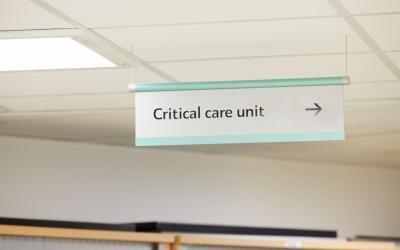Best practice in healthcare management

Good healthcare management is a must for steering effective hospitals and successful healthcare organisations. Here, we describe some good practices for managers working within this challenging but rewarding field.
Healthcare managers are responsible for running the daily operations of departments or hospitals. It’s a demanding and high-pressure job because it requires balancing the needs of the hospital or institution, the people who work there and the wider community. Some key responsibilities of healthcare managers can include:
- oversight, management and supervision of all staff and making decisions on their training and performance
- setting budgets and maintaining relationships with stakeholders
- implementing policies, guidelines and rules to meet government standards
- creating strategies to improve service delivery
- planning and coordinating non-clinical, administrative activities
- carrying out quality assurance and risk assessments
- requesting funding and deciding how it is allocated
- procuring new equipment, supplies and resources
- managing contracts and service delivery agreements.
Effective healthcare management underpins the success of many high-performance healthcare organisations. But as the long list of responsibilities detailed above shows, doing it well is no walk in the park; good healthcare management must improve and enhance patient care and improve overall healthcare outcomes while striking a balance with getting the best value for money.
Management of healthcare within the National Health Service (NHS) can be a particular challenge, with huge pressures on the system in recent years and finite public funding.
“Finding a way to juggle an impossibly long and complex list of tasks, all of which are billed as urgent priorities, is still a constant challenge for a large proportion of NHS managers, especially for those working in front-line clinical settings,” says a 2022 report by the Health Foundation on priorities for reforming NHS management and leadership.
NHS healthcare managers can be responsible for a whole service division of staff and a multi-million pound budget in a hospital trust, or for managing primary care or mental health services across many sites.
However, whether the healthcare system involves public or private hospitals, overall hospital management or looking after individual departments, there are a number of universal good healthcare management practices and considerations for running healthcare systems successfully.
Improving patient care
Some good healthcare management practices to ensure patients are getting the very best care, and, for improving that care include:
- Appropriate allocation of medical equipment, staff and facilities to reduce waiting times, minimise medical error and keep patients moving through the system.
- Investing in ongoing clinical training and education for staff members to keep healthcare professionals up to date with the latest advances and best clinical practices.
- Quality improvement initiatives to improve patient care standards.
- Putting patients front and centre of care delivery so that compassionate and personalised care is assured.
- Enabling seamless continuity of care through safely and confidentially sharing patient information between healthcare providers.
- Establishing patient safety protocols to minimise medical errors, infections and other adverse events.
Cost efficiency
Some good practice considerations for getting the best value for money without sacrificing quality of care include:
- Streamlining processes: it’s the job of healthcare management to optimise processes to prevent bottlenecks and improve workflow efficiency.
- Negotiating with suppliers to get the best deals for medical supplies, equipment and medicines, not only saving costs but improving access to essential resources.
- Focusing on value for money, to deliver high care quality while controlling costs.
- Regular data-driven analysis of how resources are being used to spot inefficiencies or waste, to shape decisions about resource allocation and save money.
- Initiatives to prevent people being readmitted to hospital unnecessarily: by providing effective support and follow-up care after discharge, healthcare managers can reduce costly readmissions.
- Meticulous budget planning and management through careful assessment of financial needs, streamlining expenditure and optimal allocation of resources (without compromising patient care).
Improving healthcare outcomes
To improve outcomes for patients, there needs to be a focus on continuous quality improvement of healthcare. Some good practices here include:
- Building on a foundation of strong evidence: healthcare decision-making and treatments must be based on scientific research and proven best practices, to reduce mistakes and improve patient outcomes and quality of care.
- Following the maxim that ‘prevention is better than cure’: prioritising initiatives to detect health issues early and intervene proactively can reduce chronic disease and improve people’s overall health.
- Developing and implementing clinical pathways and protocols: by standardising methodologies, treatment plans and guidelines for different diseases and conditions, consistently high quality care can be delivered by clinicians.
- Keeping track of clinical outcomes: by monitoring and analysing patients regularly against key performance indicators and industry standard benchmarks, healthcare organisations can pinpoint areas for improvement and introduce targeted interventions to tackle them.
- Sharing skills and knowledge between disciplines: by encouraging good communication and teamwork between clinical staff from different healthcare specialisms, care becomes more comprehensive and better coordinated, ultimately benefiting patients.
- Engaging and educating patients: Patients who are well-informed and feel fully involved in managing their own health are more likely to stick to their treatment plans, leading to better health outcomes and fewer readmissions.
What personal skills does a healthcare manager need?
Leadership professionals in health management must be made of sterner stuff, because health environments are hugely dynamic, complex and stressful. Some personal skills that serve healthcare managers well include:
- Strong leadership: to motivate stakeholders and departments through difficult challenges.
- Communication skills: to foster collaboration, both internally and externally.
- A head for numbers: for budgeting, decision making and oversight of financial performance.
- Strategic nous: to aid decision-making and adapt health policy to external changes.
- Flexibility: innovation and change happens rapidly and constantly within healthcare and it is important to be adaptable to understand, for example, the cost-benefit analysis of new technologies such as electronic health records or pivoting to deal with pandemics or other emergencies.
Despite its challenges, fast pace and heavy responsibilities, healthcare management can be a hugely rewarding career. As consultancy Dovetail describes it:
“At its core, healthcare management is about taking care of people. Whether you’re working behind the scenes to improve processes and policies or working with community leaders, you can have a positive impact. As a manager, you have high-level influence to ensure facilities, services, and initiatives truly benefit the people that need them.”
Influencing tomorrow’s healthcare sector
Ready to lead on improving the healthcare systems of the future, tackling everything from public health to sustainability? The MSc Healthcare Management programme at Queen Margaret University equips learners for a career in healthcare management in the UK and further afield. Led by the Queen Margaret Business School (QMBS) and taught by the diverse and experienced staff within the School of Health Sciences and QMBS at QMU, this master’s course is taught by both health and management experts. You’ll gain critical analytical skills and some practical skills as well as the theoretical knowledge needed for professional practice within healthcare management, both in the public and private sector. Furthermore you can fit the course around your life because it is 100% online.

















The information below is required for social login
Login to your Account